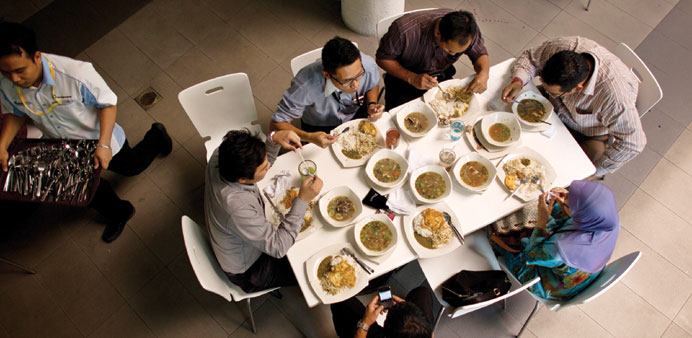Customers dine at a food court during lunch hour in the central business district in Kuala Lumpur. Under proposals being drafted by the Islamic Tourism Centre, hotels will be encouraged to stop serving alcohol, prepare food according to halal guidelines and require men and women to use facilities such as swimming pools at different times.
Bloomberg /Kuala Lumpur
Indian businessman Abdul Jamil visited Malaysia for the first time this year, drawn by the idea of a vacation offering cultural sights and amenities tailored to suit Muslims.
“Everything is easy for a Muslim on holiday here and it’s easy to get halal food,” the 62-year-old from Chennai said this week at a park in Kuala Lumpur with his wife and two children. “It would certainly be good if there were more hotels with Islamic facilities. That would make me come back.”
The number of Muslim visitors to Malaysia has more than tripled to 5.5mn since 2000, outpacing a doubling in the numbers of tourists overall, government data show, and the country’s Haj fund set up a Shariah-compliant hotel in the north-eastern state of Terengganu last year.
The worldwide Islamic tourism market will increase 52% to $192bn by 2020, according to a 2012 report by New York-based researcher DinarStandard and Singapore’s Crescentrating Pte Ltd.
The prospect of luring more such travellers is behind a government push to draw up rules to tap an estimated $126bn in Muslim tourist spending worldwide. Under proposals being drafted by the Islamic Tourism Centre, hotels will be encouraged to stop serving alcohol, prepare food according to religious guidelines and require men and women to use facilities such as swimming pools at different times, director-general Zulkifly Md Said, said in a February 24 interview in the administrative capital of Putrajaya.
“We are seeing increased interest from countries, especially in Asia, to become more Muslim-friendly,” Fazal Bahardeen, founder and chief executive officer at Crescentrating, an Islamic travel research company, said in a February 19 interview from Singapore. “It is a very fast-growing major market, comparable even to the Chinese market.”
Travel-related companies in Southeast Asia’s third-largest economy have also been active in tapping Shariah-compliant funding sources. Malaysian Airline System Bhd raised 1bn ringgit ($306mn) in a sale of sukuk with no set maturity in 2012. Issuance of ringgit-denominated Islamic bonds rose 62% so far this year to 9.5bn ringgit, data compiled by Bloomberg show.
Some 71% of the stocks traded on the country’s stock exchange are regarded as Shariah-compliant.
The Islamic Tourism Centre, set up by the government to assist the tourism ministry, is working on the new guidelines with hotel operators, tour guides and travel agents, Zulkifly said. They are targeted for completion this year and compliance won’t be mandatory as they are intended to serve as a guide to hotels that want to be more Muslim-friendly, he said.
The government estimates the number of Islamic holidaymakers in Malaysia will increase to 6mn in 2014 and 6.5mn in 2015, Zulkifly said.
“If Malaysian hoteliers and travel agents were to realign their marketing and readjust their in-house facilities, they will get the economic benefits that they are looking for.”
Some 5.5mn Muslim tourists visited Malaysia last year, compared with 1.5mn in 2000, according to figures from the Islamic Tourism Centre. Total arrivals climbed to 25.7mn in 2013 from 10.2mn in 2000, government data show.
Indonesians topped the list of Muslim tourists in Malaysia in the first nine months of 2013, making up 40% of arrivals, according to data from the Islamic Tourism Centre.
Muslim tourist spending worldwide reached $126bn in 2011, with travelers from the Gulf Co-operation Council countries accounting for 37% of that, according to the DinarStandard report. Expenditure will grow by an average 4.8% a year from 2012 through 2020, more than the 3.8% forecast for all tourist spending, and will account for 13.4% of the total, according to the report.
Non-Muslim nations are also seeking to attract Islamic travelers. New Zealand and Japan have published guides on halal restaurants and Global Health City Hospital in Chennai obtained halal certification in 2012 to tap the Shariah-compliant medical tourism market. Hotel Grand Chancellor on Australia’s Gold Coast has a Ramadan lounge for Muslims holidaying during the fasting month, joining accommodations from Dubai to Turkey that offer amenities such as prayer rooms, and halal food.
Malaysia’s economy grew 5.1% last quarter from a year earlier, the fastest pace since the final three months of 2012, official data show. Travel and tourism accounted for 15.6% of Malaysia’s gross domestic product in 2012, and this will rise to 16.8% by 2023, according to a report last year by the World Travel & Tourism Council in London.

